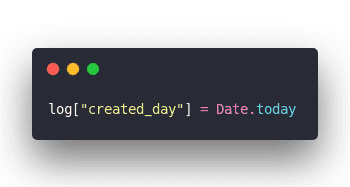Wednesday was a fun day for me my friend. A system I'd been working on for months went live and everything died. 😅

Deploy. HOT PATCH. Patch. Fix. phew
You might remember reading about this system in December when I wrote about Logging 1,721,410 events per day with Postgres, Rails, Heroku, and a bit of JavaScript. Yes I know what you're going to say ...
Yo, Swiz, dunno if you've heard, logging is a solved problem bro. It don't have to be this hard. Just write to a text file and parse it later.
Think of this more as telemetry for an entire product, business, and everything in between. We need logs from various clients (web and mobile), we need to tie those logs back to real users and devices and business tests, and we need every department in the company to use these for analytics to drive business decisions.
Yeah it touches everything.
So of course I crashed it.
Not only did I crash it. I brought down everything. Every single API that we've got was errorring out. For a whole hour.

So what happened?
The backstory is that we're moving the whole system to AWS Lambda as a ... microservice. A nanoservice? A bunch of FaaS? What do you call a gaggle of lambda functions that work together as a system?
So I've been working on that for a few months and on Wednesday it was time to unleash Phase 1 upon the world.
Pipe logs to AWS and see what happens. Disable the lambdas that push to Datadog and Mixpanel.
Goal was to run both the old and the new system in parallel and work out the kinks. I was certain something was going to go wrong. And we can't have an outage of a business critical system now can we?
Instead we had an outage of everything. 😇
Our API requests create metrics, you see. Something like backend.request.success with a bit of metadata about the request, the user, stuff like that.
Most metrics go through a function that adds more info. A sort of catch all for meta data when it makes sense.
But those backend metrics do not. There's too many of them and the metadataing is too slow. Hella SQL queries.
While refactoring I moved a piece of code from the normal flow to the metadata flow.

Moved it a few lines down.
Innocuous change right? What could possibly go wrong?

In production we use that field to build table partitions. It's a way to speed up Postgres tables by effectively splitting them into smaller tables. You need that when you're writing millions of rows per day.
Partitioning is a lot like the sharding concept from NoSQL.
You can't build partitions on null fields.
That throws a database error.
That database error says "Yo you can't write this log"
That error throws an exception
That exception bubbles up
Your API request fails
Every API request fails
Your service goes down. You have a big outage.
You have to stop eating lunch and go fix that shit. Yeah don't run a big scary deploy and go eat lunch thinking all will be well. All will not be well.

The hotpatch was easy. Move the code, deploy. Service restored.
The proper fix included writing some tests. And we discovered another error thanks to Sentry errors.
Fixing that error caused another error because I'm dumb. But that error was in the background with no effect on the end users. Just meant that a queue was filling up with data and would eventually drain when we fix the bug.
Those are the kind of errors you can take your sweet time to fix. 👌
What did I learn?
A bunch of things!
- Our Datadog alarms work great. We have a system of overlapping alarms that trigger even if parts of the system don't work. Hard to trigger a Too many errors alarm if there's no events coming through right? But you can trigger a Too few API requests alarm 😉
- It's easy to ignore alarms that look like alarms you've ignored in the past. Sometimes our alarms freak out for no reason. When that happens we've learned to say "Eh it ain't so bad we'll fix it later". That lead us astray here because a super-very-critical alarm looked a lot like a not-quite-critical alarm.
- Avoid refactors without test coverage. The root cause of my woes? Poor test coverage. Both automated test and manual QA test coverage. This is a critical system so of course we've got tests. I relied on those when refactoring. But I missed that coverage was poor so most of my code didn't even get tested. 🤦♂️
- Consider using a typed language for critical stuff. Types are like automated unit tests with 100% coverage for many sorts of checks. They totally would have caught what I broke while refactoring. AND you are forced to write types all along so coverage is 100% if you avoid
any. - Decouple. Decouple. Decouple. Then decouple some more. Why was a failure in logging able to crash the system it was observing? No excuse. The move to AWS Lambda automatically solves the problem but damn. Past Swizec why you dumb?
Lucky for me this was the only tight coupling in the system. That's why the other 3 errors weren't critical: Clients don't rely on logs succeeding. Backend processing doesn't rely on processing succeeding. Even the backend itself doesn't rely on any of that to work.
It was just this one darn thing ...
✌️
~Swizec
Continue reading about The day I crashed production 4 times
Semantically similar articles hand-picked by GPT-4
- Logging 1,721,410 events per day with Postgres, Rails, Heroku, and a bit of JavaScript
- Why you need observability more than tests
- 90% of performance is data access patterns
- A short lesson in debugging complex systems
- My biggest React App performance boost was a backend change
Learned something new?
Read more Software Engineering Lessons from Production
I write articles with real insight into the career and skills of a modern software engineer. "Raw and honest from the heart!" as one reader described them. Fueled by lessons learned over 20 years of building production code for side-projects, small businesses, and hyper growth startups. Both successful and not.
Subscribe below 👇
Software Engineering Lessons from Production
Join Swizec's Newsletter and get insightful emails 💌 on mindsets, tactics, and technical skills for your career. Real lessons from building production software. No bullshit.
"Man, love your simple writing! Yours is the only newsletter I open and only blog that I give a fuck to read & scroll till the end. And wow always take away lessons with me. Inspiring! And very relatable. 👌"
Have a burning question that you think I can answer? Hit me up on twitter and I'll do my best.
Who am I and who do I help? I'm Swizec Teller and I turn coders into engineers with "Raw and honest from the heart!" writing. No bullshit. Real insights into the career and skills of a modern software engineer.
Want to become a true senior engineer? Take ownership, have autonomy, and be a force multiplier on your team. The Senior Engineer Mindset ebook can help 👉 swizec.com/senior-mindset. These are the shifts in mindset that unlocked my career.
Curious about Serverless and the modern backend? Check out Serverless Handbook, for frontend engineers 👉 ServerlessHandbook.dev
Want to Stop copy pasting D3 examples and create data visualizations of your own? Learn how to build scalable dataviz React components your whole team can understand with React for Data Visualization
Want to get my best emails on JavaScript, React, Serverless, Fullstack Web, or Indie Hacking? Check out swizec.com/collections
Did someone amazing share this letter with you? Wonderful! You can sign up for my weekly letters for software engineers on their path to greatness, here: swizec.com/blog
Want to brush up on your modern JavaScript syntax? Check out my interactive cheatsheet: es6cheatsheet.com
By the way, just in case no one has told you it yet today: I love and appreciate you for who you are ❤️
